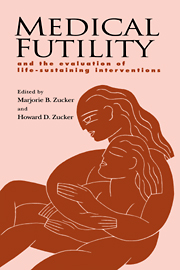Book contents
- Frontmatter
- Contents
- Preface
- Foreword
- Contributors
- 1 Medical futility: a useful concept?
- 2 Death with dignity?
- 3 Physicians and medical futility: experience in the critical care setting
- 4 Physicians and medical futility: experience in the setting of general medical care
- 5 Futility issues in pediatrics
- 6 Medical futility: a nursing home perspective
- 7 Alternative medicine and medical futility
- 8 How culture and religion affect attitudes toward medical futility
- 9 When religious beliefs and medical judgments conflict: civic polity and the social good
- 10 Conflict resolution: experience of consultation-liaison psychiatrists
- 11 Ethics committees and end-of-life decision making
- 12 The economics of futile interventions
- 13 Medical futility: a legal perspective
- 14 Professional and public community projects for developing medical futility guidelines
- 15 Community futility policies: the illusion of consensus?
- 16 Not quite the last word: scenarios and solutions
- Index of cited authors, cases, and statutes
- Subject index
14 - Professional and public community projects for developing medical futility guidelines
Published online by Cambridge University Press: 11 September 2009
- Frontmatter
- Contents
- Preface
- Foreword
- Contributors
- 1 Medical futility: a useful concept?
- 2 Death with dignity?
- 3 Physicians and medical futility: experience in the critical care setting
- 4 Physicians and medical futility: experience in the setting of general medical care
- 5 Futility issues in pediatrics
- 6 Medical futility: a nursing home perspective
- 7 Alternative medicine and medical futility
- 8 How culture and religion affect attitudes toward medical futility
- 9 When religious beliefs and medical judgments conflict: civic polity and the social good
- 10 Conflict resolution: experience of consultation-liaison psychiatrists
- 11 Ethics committees and end-of-life decision making
- 12 The economics of futile interventions
- 13 Medical futility: a legal perspective
- 14 Professional and public community projects for developing medical futility guidelines
- 15 Community futility policies: the illusion of consensus?
- 16 Not quite the last word: scenarios and solutions
- Index of cited authors, cases, and statutes
- Subject index
Summary
Although exploration of medical futility usually begins with the professional community, the development of treatment abatement guidelines ought to consider the perspective of the public community as well. The professional and public communities must become partners in order to synthesize the two perspectives into a unified approach to the issue of medical futility. This synthesis is an example on the societal level of shared decision making between patient and physician on the clinical level.
This chapter describes specific attempts to develop futility guidelines for local public and professional communities, working separately and together. The projects were the topics of a meeting on the development of treatment abatement guidelines in situations of medical futility held in Kansas City, Missouri, January 26 and 27, 1996. The meeting was facilitated by the Midwest Bioethics Center, with generous funding from Employers Reinsurance Corporation and Hoechst Marion Roussel, Inc. Participants included project directors, national thought leaders, and Midwest Bioethics Center staff. A list of participants can be obtained from the authors.
Such shared decision making is one of the primary goals of the bioethics movement. Adequate attention to the diverse perspectives of differing moral communities when considering issues of respect for autonomy, beneficence, and justice will require careful compromise and search for a middle ground among multiple polarities. Consensus building in a morally pluralistic culture is a challenge to a liberal democratic society.
- Type
- Chapter
- Information
- Medical FutilityAnd the Evaluation of Life-Sustaining Interventions, pp. 155 - 167Publisher: Cambridge University PressPrint publication year: 1997

